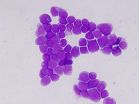(Press-News.org) A new study finds that an FDA-approved drug to treat the rare autoimmune disorder immune thromobocytopenia (ITP) is more effective than earlier medical therapies in helping patients avoid surgical treatment and significantly improving their quality of life. The paper in the Nov. 11 New England Journal of Medicine reports that treatment with romiplostim, which mimics the effects of a growth factor that regulates platelet production, was more than three times more successful than standard therapy with steroids or immunosuppressive drugs.
"This is the first definitive study with this type of medication showing that patients experienced significant clinical improvements, not just increased platelet levels," says David Kuter, MD, DPhil, of the Massachusetts General Hospital (MGH) Cancer Center, lead and corresponding author of the study. "It confirms that treatment really makes a difference for patients beyond improving platelet counts."
In ITP, which affects about one in 10,000 individuals, the immune system produces antibodies against platelets, blood cells that are essential to clot formation. Platelets are targeted for destruction in the spleen, putting patients at risk for uncontrolled bleeding. While the condition in children usually resolves within 6 months, in three-quarters of affected adults it becomes chronic. To prevent serious bleeding episodes, patients may seriously curtail their lifestyle, avoiding physical activity and medical procedures like colonoscopy and dental extractions.
Medical treatment for ITP has long relied on steroids or immunosuppressive drugs, which have significant side effects that many patients find intolerable. Most patients eventually have their spleens removed, which can raise platelet levels for up to five years; but for older patients or those with some medical conditions, splenectomy may not be safe or medically appropriate. Clinical trials of romiplostim, one of a new group of drugs that mimic the effects of the growth factor thrombopoietin, showed that it increased the platelet counts of ITP patients for up to five years, but those studies neither compared its effects to those of standard treatments nor examined the clinical relevance of the higher platelet levels.
The current study – sponsored by Amgen, which markets romiplostim under the brand name Nplate – enrolled 234 adult ITP patients at 85 sites in North America, Europe and Australia. Participants, none of whom had their spleens removed, were randomly assigned either the standard care medications prescribed by their treating physicians or weekly romiplostim injections. Participants in both groups were able to receive other therapies that became necessary. Treatment was considered to be ineffective if platelet levels remained low for four consecutive weeks or if participants experienced major bleeding events or required changes in therapy, including splenectomy.
At the end of the 52-week study period, participants receiving romiplostim achieved and maintained desirable platelet levels at more than twice the rate of those on standard care. Overall, romiplostim treatment was at least three times as effective as other treatments, and participants receiving the drug had a 90 percent reduction in the need for splenectomy. Responses to several quality-of-life survey instruments were significantly higher for participants receiving romiplostim.
"We expected that this medication would be more effective than the standard of care but were surprised at how much more effective it was," says Kuter. Several questions still need to be resolved before the place of romiplostim in long-term treatment of ITP can be determined, he notes. One is the treatment's cost effectiveness, since it is expensive; another is whether patients receiving romiplostim can continue to avoid splenectomy for longer than a year. Additional research also needs to determine whether romiplostim treatment may be continued indefinitely.
"Our study enrolled patients at various stages of their disease – some who had recently been diagnosed, some who'd been treated for many years. Future studies need to look at whether romiplostim may be an appropriate first-line treatment for recently diagnosed patients, allowing them to completely avoid taking steroids," says Kuter, who is director of the Center for Hematology at the MGH Cancer Center and a professor of Medicine at Harvard Medical School.
INFORMATION:
Co-authors of the NEJM report are Mathias Rummel, MD, Justus-Liebig University Clinic, Giessen, Germany; Ralph Boccia, MD, Center for Cancer and Blood Disorders, Bethesda, Maryland; Gail Macik, MD, University of Virginia, Charlottesville; Ingrid Pabinger, MD, Medical University of Vienna, Austria; Dominik Selleslag, MD, Algeemen Hospital Sint-Jan; Bruges, Belgium; Francesco Rodeghiero, MD, San Bortolo Hospital, Vincenza, Italy; Beng Chong, MD, University of New South Wales, Australia; and Xeuna Wang, PhD, and Dietmar Berger, MD, PhD, Amgen.
Massachusetts General Hospital, established in 1811, is the original and largest teaching hospital of Harvard Medical School. The MGH conducts the largest hospital-based research program in the United States, with an annual research budget of more than $600 million and major research centers in AIDS, cardiovascular research, cancer, computational and integrative biology, cutaneous biology, human genetics, medical imaging, neurodegenerative disorders, regenerative medicine, systems biology, transplantation biology and photomedicine.
END
HOUSTON -- (Nov. 11, 2010) – The brain works because 100 billion of its special nerve cells called neurons regulate trillions of connections that carry and process information. The behavior of each neuron is precisely determined by the proper function of many genes.
In 1999, Baylor College of Medicine (www.bcm.edu) researcher Dr. Huda Zoghbi (http://www.bcm.edu/genetics/index.cfm?pmid=11053), and her colleagues identified mutations in one of these genes called MECP2 as the culprit in a devastating neurological disorder called Rett syndrome (http://www.nichd.nih.gov/health/topics/rett_syndrome.cfm). ...
A University of Colorado at Boulder-led study shows that specific types of stem cells transplanted into the leg muscles of mice prevented the loss of muscle function and mass that normally occurs with aging, a finding with potential uses in treating humans with chronic, degenerative muscle diseases.
The experiments showed that when young host mice with limb muscle injuries were injected with muscle stem cells from young donor mice, the cells not only repaired the injury within days, they caused the treated muscle to double in mass and sustain itself through the lifetime ...
The computer game Tetris may have a special ability to reduce flashbacks after viewing traumatic images not shared by other types of computer game, Oxford University scientists have discovered in a series of experiments.
In earlier laboratory work the Oxford team showed that playing Tetris after traumatic events could reduce memory flashbacks in healthy volunteers. These are a laboratory model of the types of intrusive memories associated with post-traumatic stress disorder (PTSD).
In this new experimental study, the researchers compared the effectiveness of Tetris ...
Men taking androgen deprivation therapy (ADT) for prostate cancer may have an increased risk of colorectal cancer, according to a study published online November 10 in The Journal of the National Cancer Institute.
Androgen deprivation therapy is a widely-prescribed treatment in men with prostate cancer, although its usage for low-risk disease remains controversial, given the adverse side effects, including osteoporosis, cardiovascular disease, diabetes and obesity; the last two are risk factors for colorectal cancer.
To determine whether prostate cancer patients taking ...
Think New York is an exceptional city? It's not. The Big Apple is just about average for a city of its size. However, San Francisco is exceptional. Its inhabitants are wealthier, more productive, more innovative, and subject to fewer crimes than you would expect, given its size.
Turns out many of the cities we typically think of as great ones probably wouldn't show up near the top of most rankings, if Luis Bettencourt of the Santa Fe Institute has his way. He and his colleagues believe traditional per-capita measures are not very useful for determining what makes one ...
Obstetricians and midwives should wait a few minutes before clamping the umbilical cords of newborn infants so that babies are not harmed by the procedure, argues Dr David Hutchon in an article published on bmj.com today.
Hutchon, a retired consultant obstetrician from the Memorial Hospital in Darlington, says it's time for the UK to follow guidance from the World Health Organisation and the International Federation of Gynaecology and Obstetrics and refrain from early cord clamping.
Despite evidence for the benefit of delayed cord clamping, clinicians in the UK seem ...
AUDIO:
Researchers at Washington University in St. Louis have identified mutations in a single gene that are associated with a poor prognosis for patients with acute myeloid leukemia. The discovery suggests...
Click here for more information.
Decoding the DNA of a woman who died of acute myeloid leukemia (AML) has led researchers at Washington University School of Medicine in St. Louis to a gene that they found to be commonly altered in many patients who died quickly of ...
Researchers have discovered mutations in a particular gene that affects the treatment prognosis for some patients with acute myeloid leukemia (AML), an aggressive blood cancer that kills 9,000 Americans annually. The scientists report their results in the Nov. 11, 2010, on-line issue of The New England Journal of Medicine.
The Washington University School of Medicine in St. Louis team initially discovered a mutation by completely sequencing the genome of a single AML patient. They then used targeted DNA sequencing on nearly 300 additional AML patient samples to confirm ...
An Australian research team from the Peter MacCallum Cancer Centre, the University of Melbourne and the University of Queensland has identified a new risk factor for developing breast cancer. This has been published online in the journal Cancer Prevention Research.
The risk factor involves a modification (DNA methylation) to the BRCA1 gene. BRCA1 is known for its involvement in breast and ovarian cancer. Women with mutations in this gene, which inactivates its function, are predisposed to these diseases.
The DNA methylation modification is known as an epimutation and ...
Variations in atmosphere carbon dioxide around 40 million years ago were tightly coupled to changes in global temperature, according to new findings published in the journal Science. The study was led by scientists at Utrecht University, working with colleagues at the NIOZ Royal Netherlands Institute for Sea Research and the University of Southampton.
"Understanding the relationship between the Earth's climate and atmospheric carbon dioxide in the geological past can provide insight into the extent of future global warming expected to result from carbon dioxide emission ...

